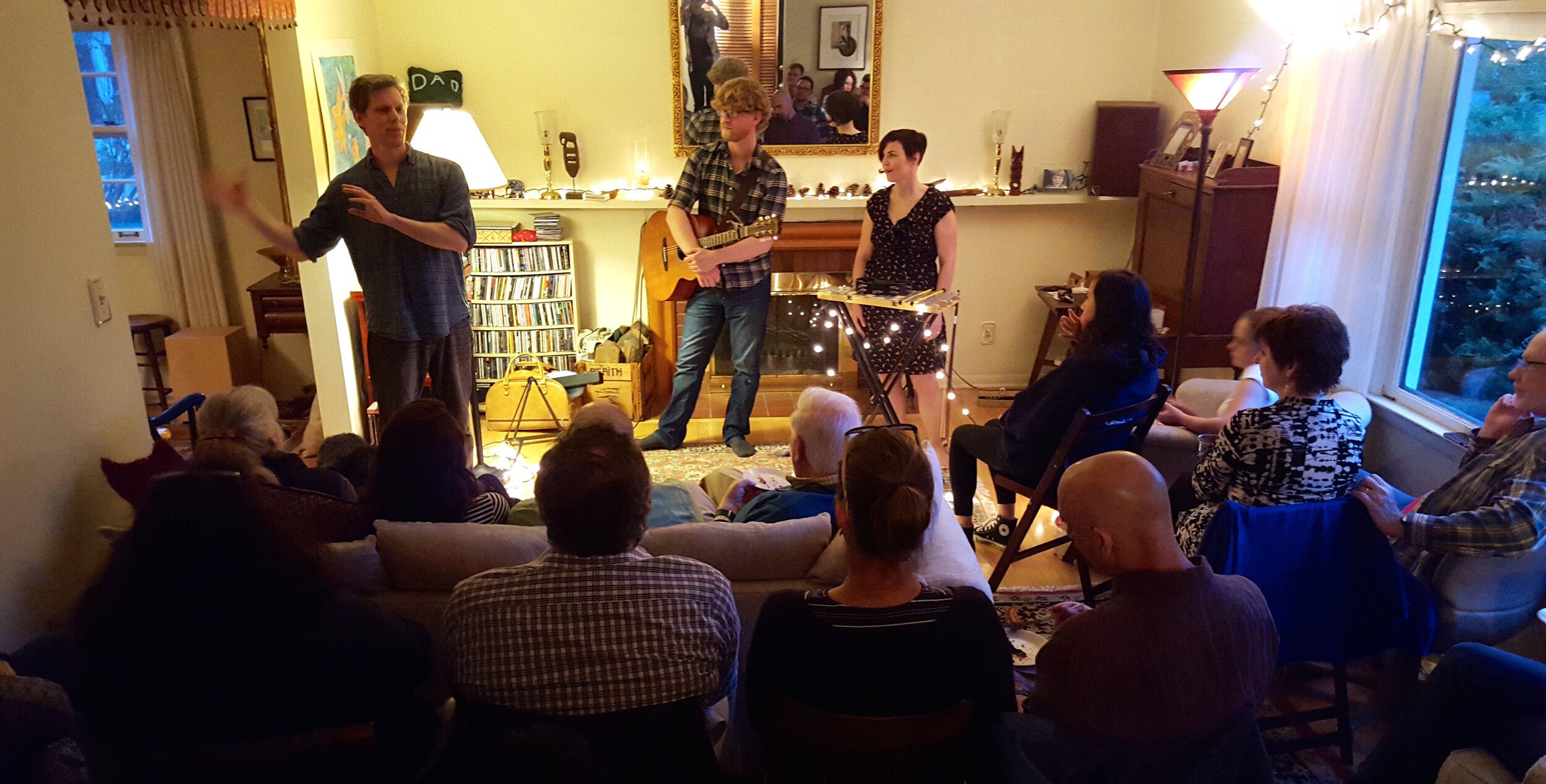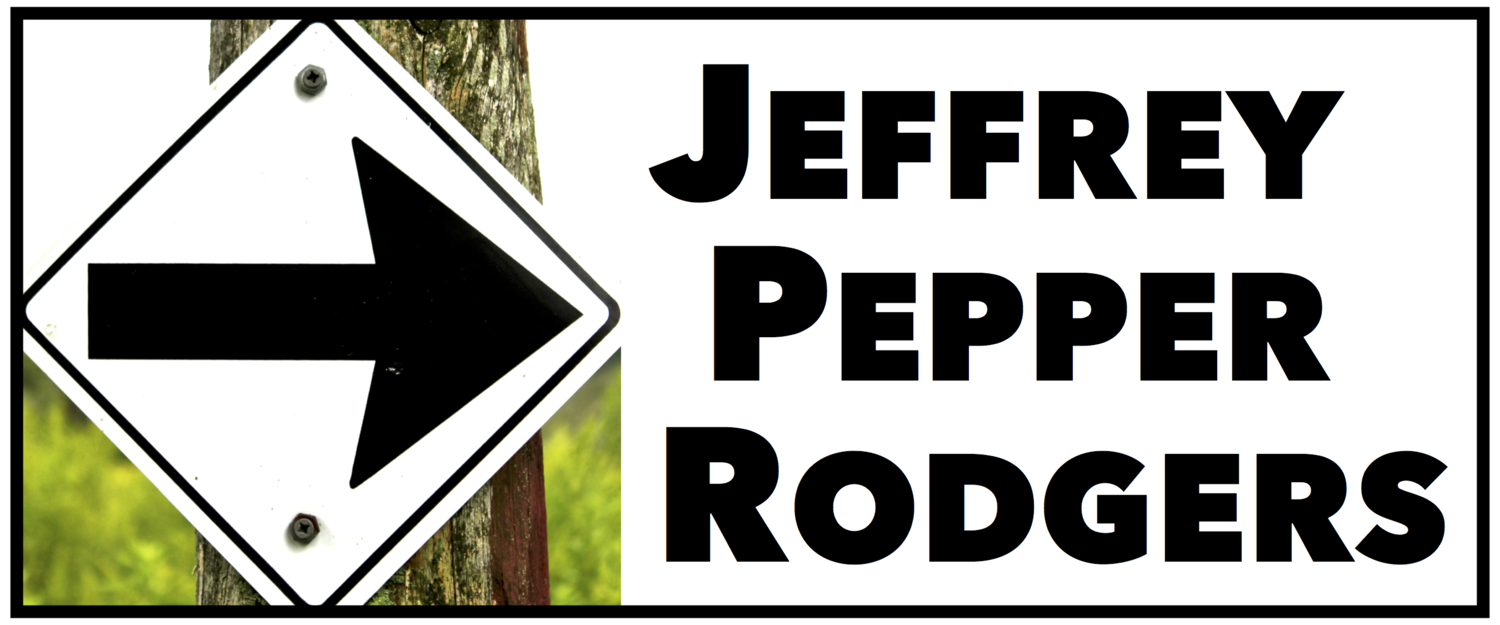
How to host a house concert
Some of the best live music experiences these days can be found right in people’s homes, thanks to the grassroots phenomenon of house concerts.
If you haven’t been to a house concert before, it’s simply an up-close-and-personal performance—live in the living room, den, barn, backyard, or wherever—for an audience of friends and neighbors. There is a suggested donation for the performer, and often people bring drinks or food to share.
As a lifelong acoustic musician, I love having the chance to play music in such an intimate setting with minimal or no amplification, and I’ve also had wonderful experiences hosting house concerts with some of my favorite songwriters (in the photo above, I’m introducing the Young Novelists in my living room).
Interested in hosting a concert in your home? It’s easy and fun. Here are the basics.
The space
All you need is a space big enough to seat 15 to 30 people or more, with a clear area on one side for the performer(s). You’d be surprised how many people fit comfortably in an average living room when you move some furniture and bring in small chairs.
An outdoor show, in a backyard or even a driveway, can be a great option. I’ve hosted some backyard shows (bring your own lawn chairs and food/beverages), using my deck as a stage, that were a real treat. A canopy/tent big enough to cover the performers can be good to have, plus of course some kind of lighting for evening shows.
A backyard concert with my band, using a compact sound system with two Fishman tower amps. Photo by Willson Cummer.
Sound equipment
In most living-room-type situations, I prefer using no sound equipment—it’s a revelation for many people to experience truly unplugged music, without the barriers of mic stands and speakers. Some performers, though, sing or play softly and are more comfortable using some amplification.
If you do want to use sound reinforcement, keep it as simple and unobtrusive as possible. A touch of amplification goes a long way. For a solo performer, a single large-diaphragm mic for voice and instrument can give a little boost while maintaining the stripped-down acoustic vibe. A small acoustic amp can serve nicely as a mini sound system.
Outdoors (as well in larger indoor spaces and with bands), you’ll likely need some kind of PA for instruments and voices to carry. You don’t need to blast people out, though. Letting neighbors know about your event in advance, and asking if they have questions or concerns, is an important courtesy. In my own backyard shows, I’ve even had immediate neighbors set up their own satellite parties where they can hear the music.
The audience
Invite your friends and neighbors, and encourage them to spread the word to their friends too. In hosting house concerts, I’ve found that people come not because they necessarily know the performer but because hearing live music in this kind of down-home environment is such a special experience.
Typically the invitation includes only the date, the town/city, and the host’s email address for inquiries. When you confirm a reservation, you supply the street address and other details.
If I’m hosting a touring artist, I tell them it’s fine to list the show on their website calendar—again with just the date, city, and either my email or a link for reservations.
If you’re hosting a show and want to limit the guest list to your friends, discuss that with the performer in advance.
Invitations
Send your invitations a month or so before the concert, and ask people to reserve seats. You can use email or a service like Eventbrite that tracks RSVPs. You will probably need to send a few reminders in the weeks leading up to the show.
Creating a Facebook event and inviting friends that way can be helpful too, as a backup for email. In my experience, email reservations are far more reliable than Facebook RSVPs as an indicator of who will actually come to an event.
A few tips for invitations:
Stress that space is limited and reservations are required.
Describe (briefly) what a house concert is and how it works, including the suggested donation, for the uninitiated.
Share your own enthusiasm for the music—that’s the best way to draw an audience!
Include YouTube and website links where people can sample the music and learn more.
Even if people make firm reservations, assume that a few will back out at the last minute because of illness, weather, etc. If your reservations hit capacity, keep a waiting list or even overbook a bit so seats don’t go empty.
Here are a few sample invitations: for a backyard show through Eventbrite (click view details) and a duo house concert.
Donations
Instead of tickets, house concerts have a suggested donation (typically $15 to $25) for the performer. Most hosts simply pass 100 percent of donations to the performer—and let attendees know that they are doing so. Sometimes hosts retain a portion of donations to cover their expenses; if you are hosting and need to do that, just be sure to talk with the performer about that in advance.
You can put a donation basket in a spot where people will see it as they enter or leave, and/or pass the basket when everyone is seated. Be sure to remind people about the donation at the beginning of the concert or at intermission.
In addition to cash, accepting donations electronically is a good idea. In house concert invitations, I always include Venmo and PayPal links for donations, and many people use that option. I also make a sign by the donation basket with a QR code or donation link.
Some touring artists do house concerts for a flat fee, and it’s up to the host whether to cover that amount or ask guests for donations.
The schedule
A typical concert is two 45-minute sets with a 20- to 30-minute intermission. It’s nice to have some socializing time beforehand too, so you might tell people the show is (for instance) doors at 6 or 6:30, music at 7.
Merch
Designate a good spot for laying out CDs and other merchandise, where there’s room for people to congregate and chat.
Food and drink
If you like, you can offer drinks and snacks and/or invite people to bring something to share. Some house concerts even include a pot-luck meal.
Accommodations
For any artist on tour, a room for the night and a home-cooked meal is greatly appreciated. If you are hosting a touring performer, just be respectful of their need for downtime and sleep.
Booking
If you’re interested in hosting a house concert with me, find more info here.

